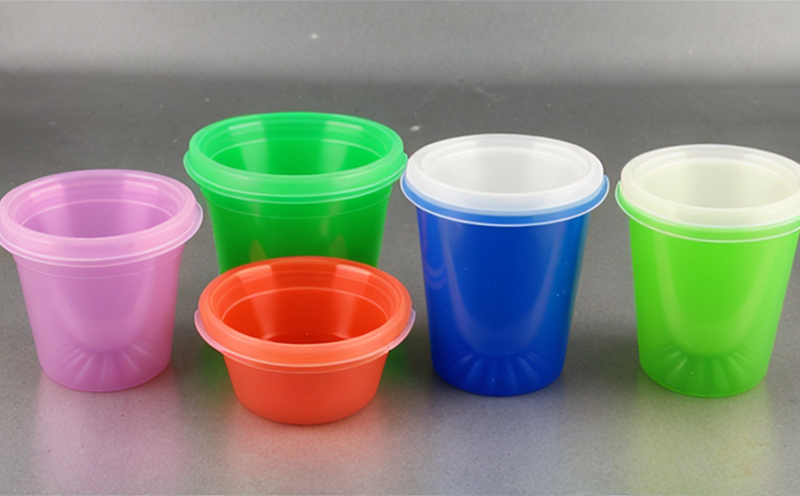DIN EN ISO 22007 Thermal Conductivity Testing of Disposable Plastics
The DIN EN ISO 22007 standard provides a robust framework for the determination of thermal conductivity in various materials, including disposable plastics. This service is particularly crucial for ensuring that products meet stringent safety and performance requirements set by regulatory bodies. The test measures how efficiently heat can transfer through different plastic materials under controlled conditions.
The process involves precise specimen preparation to ensure accurate results. Specimens are cut to standard dimensions and conditioned in a controlled environment to stabilize their moisture content, which is critical for obtaining reliable thermal conductivity values. The test apparatus used adheres strictly to the requirements outlined in DIN EN ISO 22007, ensuring that the measurements are both repeatable and reproducible.
Theoretical considerations play an essential role in understanding the practical application of this testing method. For instance, different types of disposable plastics exhibit varying thermal properties due to their chemical compositions and molecular structures. Understanding these nuances helps manufacturers design products with optimal heat management capabilities, which is vital for applications like medical disposables or food packaging.
The standard also specifies the use of specific instruments designed to apply controlled heating sources while measuring temperature changes across the specimen. These instruments must be calibrated regularly to maintain accuracy and precision throughout testing cycles. Compliance officers and quality managers will find this service invaluable as it helps ensure that products comply with industry standards, thereby minimizing safety risks associated with improper thermal management.
Real-world applications of this testing method extend beyond mere compliance; they also contribute significantly towards product development efforts aimed at improving performance and reducing environmental impact. By leveraging the insights gained from such tests, R&D engineers can innovate new formulations that enhance heat resistance or insulate better against cold temperatures – attributes particularly relevant for single-use items used in various industries.
For procurement teams looking to source materials with specific thermal characteristics, this service provides objective data that supports informed decision-making processes. It allows them to compare suppliers based on consistent quality metrics rather than subjective assessments alone. Furthermore, it fosters transparency within supply chains by ensuring all parties involved adhere to internationally recognized standards.
- Thermal conductivity testing is essential for ensuring product safety and performance.
- It supports regulatory compliance while offering valuable insights into material behavior under various conditions.
Benefits
DIN EN ISO 22007 thermal conductivity testing offers numerous advantages for manufacturers, especially those involved in producing disposable plastics. Here are some key benefits:
- Enhanced Product Quality: This service ensures that all manufactured items meet high-quality standards set by international regulations.
- Better Compliance: By adhering to these rigorous testing protocols, companies can confidently demonstrate their commitment to meeting relevant legal requirements.
- Improved Safety: Accurate thermal conductivity measurements help identify potential hazards associated with improper heat management in disposable products.
- Competitive Edge: Demonstrating adherence to global standards enhances brand reputation and attracts customers seeking eco-friendly solutions.
Why Choose This Test
Selecting DIN EN ISO 22007 thermal conductivity testing for disposable plastics involves several compelling reasons:
- Accurate Measurement: The method provides precise and reliable data about the thermal properties of materials.
- International Recognition: Compliance with this standard ensures that results are accepted globally, facilitating easier market access.
- Informed Decision-Making: Manufacturers gain valuable insight into how their products perform under different conditions.
- Consistent Quality: Regular testing maintains consistent quality across production batches and suppliers.
Quality and Reliability Assurance
To maintain high levels of confidence in the results produced by DIN EN ISO 22007 thermal conductivity tests, several measures are implemented:
- Calibration Checks: All testing equipment is regularly calibrated using certified standards.
- Sustained Training: Staff involved in conducting these tests undergo continuous training to stay updated on best practices and technological advancements.
- Standard Operating Procedures (SOPs): Strict adherence to SOPs ensures that every test follows the same rigorous protocol, minimizing variability.
The importance of these measures cannot be overstated; they form the backbone of our commitment to delivering accurate, reliable results. Our lab has invested heavily in state-of-the-art equipment and personnel training programs to ensure that we meet or exceed all relevant requirements.





